Walbank F.W., Astin A.E., Frederiksen M.W., Ogilvie R.M. The Cambridge Ancient History, Volume 7, Part 1: The Hellenistic World
Подождите немного. Документ загружается.

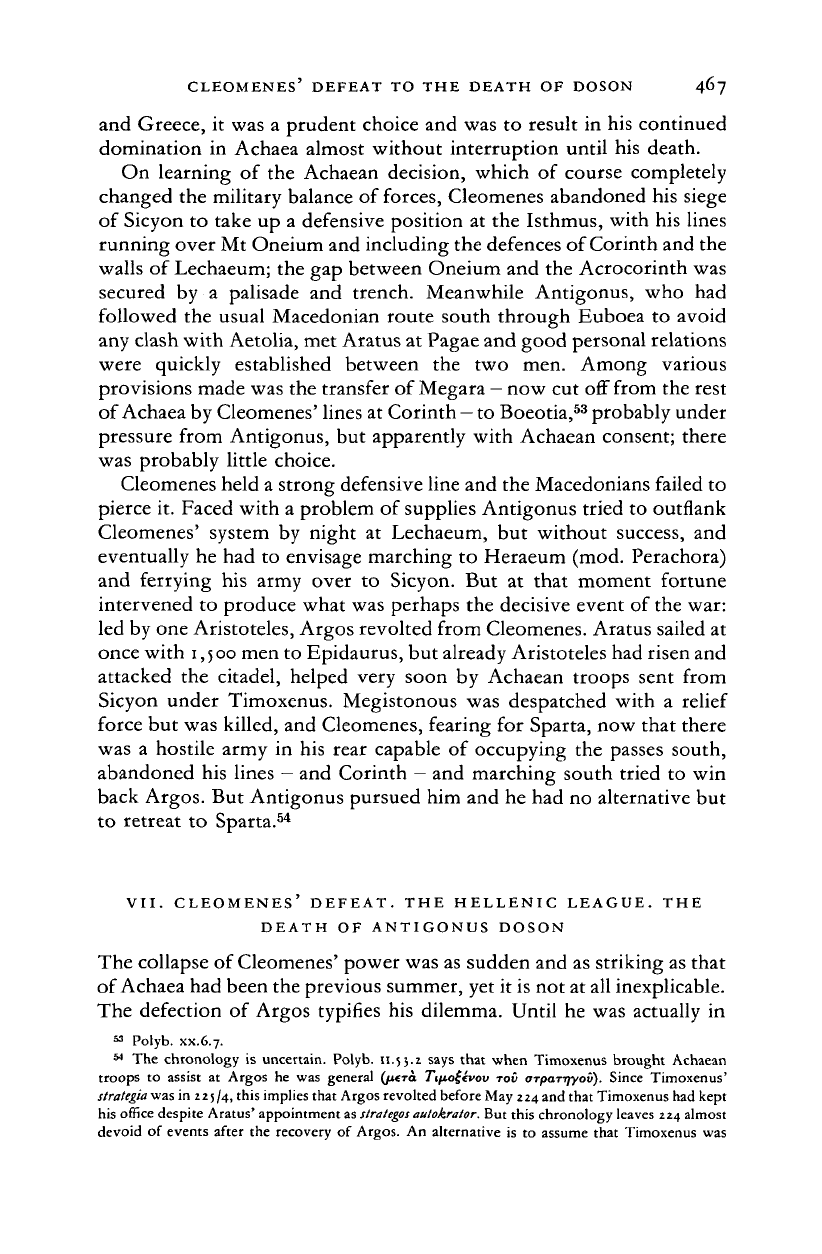
CLEOMENES' DEFEAT
TO THE
DEATH
OF
DOSON
467
and Greece,
it
was
a
prudent choice and was
to
result
in
his continued
domination
in
Achaea almost without interruption until
his
death.
On learning
of
the Achaean decision, which
of
course completely
changed the military balance
of
forces, Cleomenes abandoned his siege
of Sicyon
to
take
up a
defensive position
at
the Isthmus, with his lines
running over Mt Oneium and including the defences of Corinth and the
walls
of
Lechaeum; the gap between Oneium and the Acrocorinth was
secured
by a
palisade
and
trench. Meanwhile Antigonus,
who
had
followed
the
usual Macedonian route south through Euboea
to
avoid
any clash with Aetolia, met Aratus at Pagae and good personal relations
were quickly established between
the two men.
Among various
provisions made was the transfer
of
Megara
-
now cut off from the rest
of Achaea by Cleomenes' lines at Corinth
—
to Boeotia,
53
probably under
pressure from Antigonus,
but
apparently with Achaean consent; there
was probably little choice.
Cleomenes held a strong defensive line and the Macedonians failed
to
pierce it. Faced with
a
problem
of
supplies Antigonus tried
to
outflank
Cleomenes' system
by
night
at
Lechaeum,
but
without success,
and
eventually he had
to
envisage marching
to
Heraeum (mod. Perachora)
and ferrying
his
army over
to
Sicyon.
But
at
that moment fortune
intervened
to
produce what was perhaps the decisive event
of
the war:
led by one Aristoteles, Argos revolted from Cleomenes. Aratus sailed at
once with
i
,500 men to Epidaurus, but already Aristoteles had risen and
attacked
the
citadel, helped very soon
by
Achaean troops sent from
Sicyon under Timoxenus. Megistonous
was
despatched with
a
relief
force but was killed, and Cleomenes, fearing
for
Sparta, now that there
was
a
hostile army
in
his
rear capable
of
occupying
the
passes south,
abandoned
his
lines
—
and Corinth
—
and marching south tried
to
win
back Argos. But Antigonus pursued him and he had no alternative but
to retreat
to
Sparta.
54
VII.
CLEOMENES' DEFEAT. THE HELLENIC LEAGUE. THE
DEATH OF ANTIGONUS DOSON
The collapse of Cleomenes' power was as sudden and as striking as that
of Achaea had been the previous summer, yet
it
is not at all inexplicable.
The defection
of
Argos typifies
his
dilemma. Until
he
was actually
in
*> Polyb. xx.6.7.
54
The
chronology
is
uncertain. Polyb.
11.53.
2
sa
y
s triat
when Timoxenus brought Achaean
troops
to
assist
at
Argos
he
was
general
(JICTOL
Tifio£cvov
rov
OTparrfyov).
Since Timoxenus'
strategia
was in 225/4, this implies that Argos revolted before May 224 and that Timoxenus had kept
his office despite Aratus' appointment as
strategos
aulokralor.
But this chronology leaves 224 almost
devoid
of
events after
the
recovery
of
Argos.
An
alternative
is to
assume that Timoxenus
was
Cambridge Histories Online © Cambridge University Press, 2008
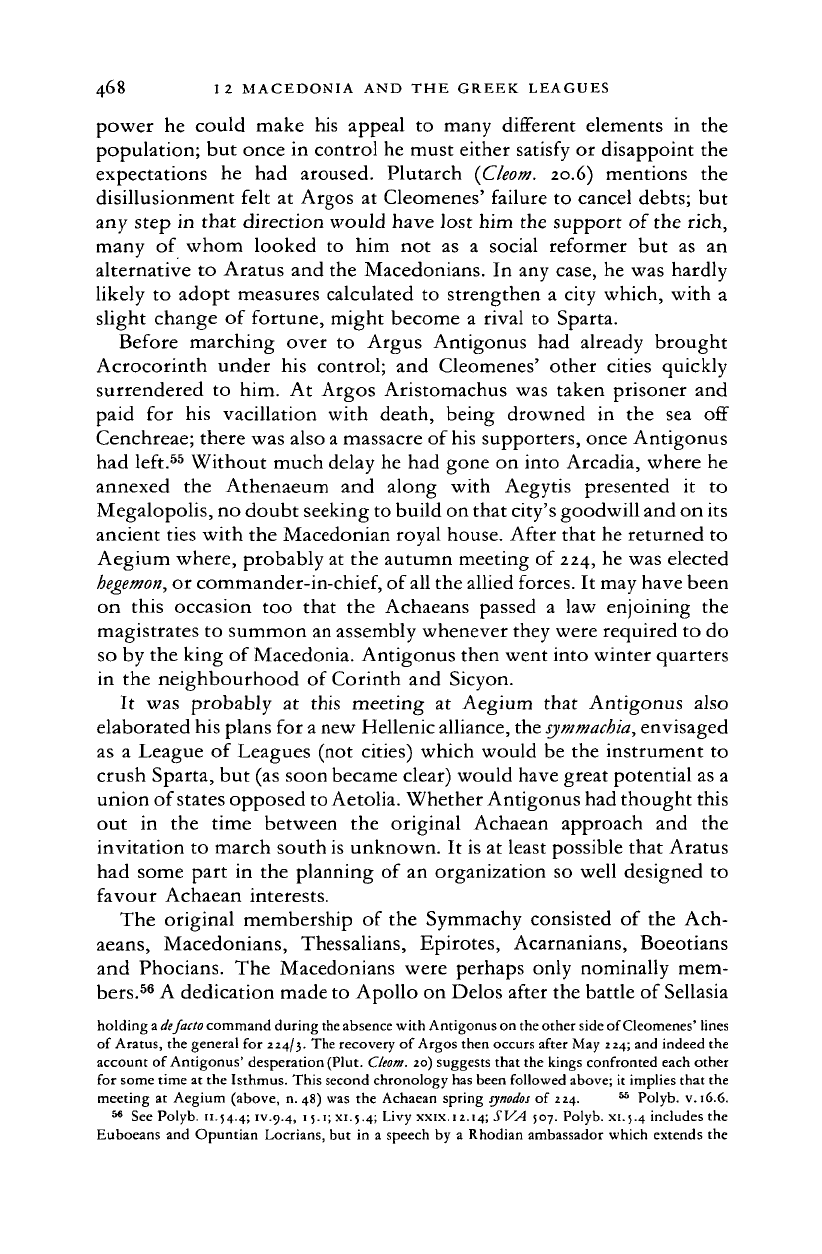
468 12 MACEDONIA AND THE GREEK LEAGUES
power
he
could make
his
appeal
to
many different elements
in the
population;
but
once
in
control he must either satisfy
or
disappoint
the
expectations
he had
aroused. Plutarch
{Cleom.
20.6)
mentions
the
disillusionment felt
at
Argos
at
Cleomenes' failure
to
cancel debts;
but
any step
in
that direction would have lost him the support
of
the rich,
many
of
whom looked
to him not as a
social reformer
but as an
alternative
to
Aratus and the Macedonians.
In
any case,
he
was hardly
likely
to
adopt measures calculated
to
strengthen
a
city which, with
a
slight change
of
fortune, might become
a
rival
to
Sparta.
Before marching over
to
Argus Antigonus
had
already brought
Acrocorinth under
his
control;
and
Cleomenes' other cities quickly
surrendered
to
him.
At
Argos Aristomachus
was
taken prisoner
and
paid
for his
vacillation with death, being drowned
in the sea off
Cenchreae; there was also
a
massacre
of
his supporters, once Antigonus
had left.
55
Without much delay he had gone
on
into Arcadia, where
he
annexed
the
Athenaeum
and
along with Aegytis presented
it to
Megalopolis, no doubt seeking to build on that city's goodwill and on its
ancient ties with the Macedonian royal house. After that he returned
to
Aegium where, probably at the autumn meeting
of
224, he was elected
hegemon,
or
commander-in-chief, of
all
the allied forces.
It
may have been
on this occasion
too
that
the
Achaeans passed
a law
enjoining
the
magistrates
to
summon an assembly whenever they were required
to do
so by the king
of
Macedonia. Antigonus then went into winter quarters
in
the
neighbourhood
of
Corinth
and
Sicyon.
It
was
probably
at
this meeting
at
Aegium that Antigonus also
elaborated his plans for a new Hellenic alliance, the
symmachia,
envisaged
as
a
League
of
Leagues
(not
cities) which would
be the
instrument
to
crush Sparta, but (as soon became clear) would have great potential as
a
union of states opposed to Aetolia. Whether Antigonus had thought this
out
in the
time between
the
original Achaean approach
and the
invitation
to
march south is unknown.
It
is
at
least possible that Aratus
had some part
in the
planning
of
an organization
so
well designed
to
favour Achaean interests.
The original membership
of
the Symmachy consisted
of the Ach-
aeans,
Macedonians, Thessalians, Epirotes, Acarnanians, Boeotians
and Phocians.
The
Macedonians were perhaps only nominally mem-
bers.
56
A dedication made to Apollo on Delos after the battle
of
Sellasia
holding
a defacto
command during the absence with Antigonus on the other side of Cleomenes' lines
of Aratus, the general
for
224/3.
The recovery
of
Argos then occurs after May 224; and indeed the
account
of
Antigonus' desperation (Plut.
Cleom.
20) suggests that the kings confronted each other
for some time
at
the Isthmus. This second chronology has been followed above;
it
implies that the
meeting
at
Aegium (above, n. 48) was
the
Achaean spring
synodos
of
224.
^
Polyb. v. 16.6.
56
See Polyb. n.54.4; iv.9.4,
15.1;
xi.5.4; Livy xxix.
12.14;
SVA
507. Polyb. xi.5.4 includes
the
Euboeans
and
Opuntian Locrians,
but in a
speech
by a
Rhodian ambassador which extends
the
Cambridge Histories Online © Cambridge University Press, 2008
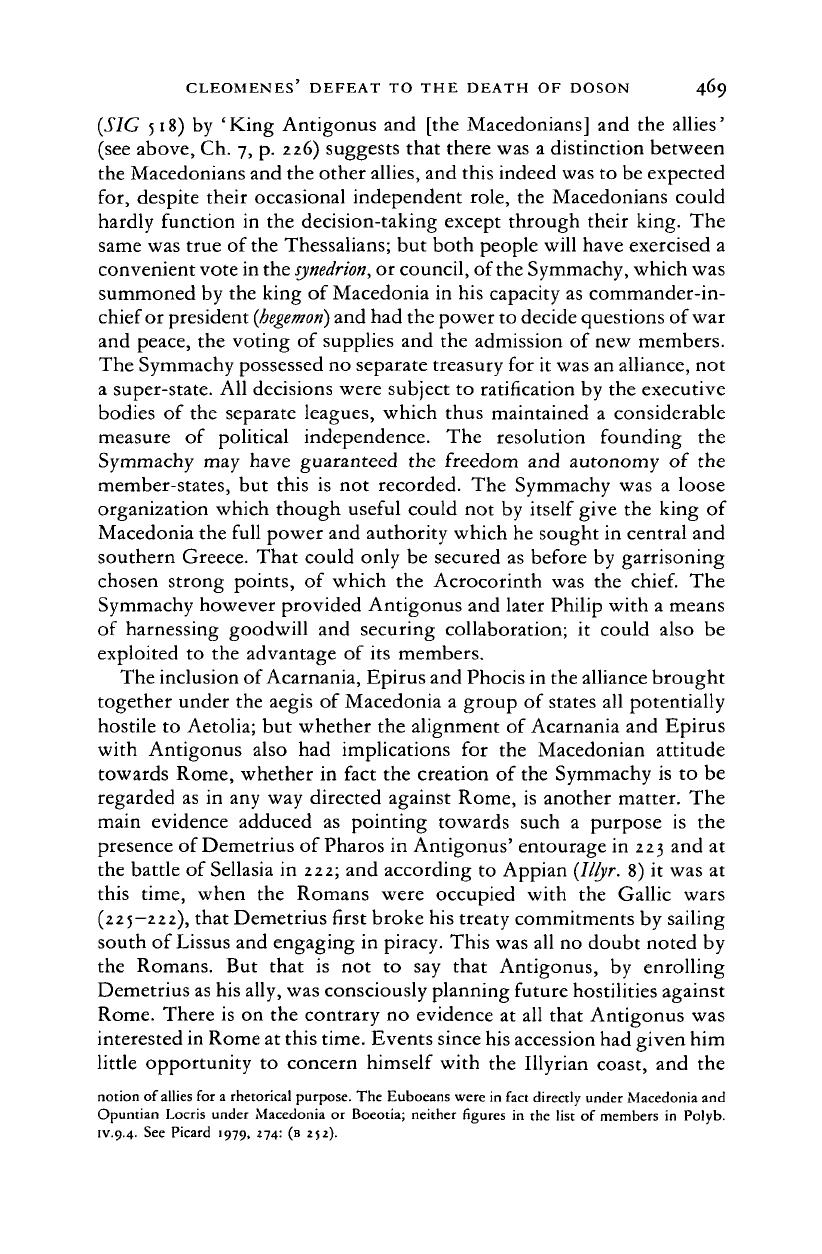
CLEOMENES' DEFEAT TO THE DEATH OF DOSON 469
(S1G 518)
by
'King Antigonus
and
[the Macedonians]
and the
allies'
(see above, Ch.
7,
p. 226) suggests that there was a distinction between
the Macedonians and the other allies, and this indeed was to be expected
for, despite their occasional independent role,
the
Macedonians could
hardly function
in the
decision-taking except through their king.
The
same was true
of
the Thessalians; but both people will have exercised
a
convenient vote in the
synedrion,
or council, of the Symmachy, which was
summoned by the king
of
Macedonia
in
his capacity as commander-in-
chief or president
{hegemon)
and had the power to decide questions of war
and peace,
the
voting
of
supplies
and the
admission
of
new members.
The Symmachy possessed no separate treasury
for it
was an alliance, not
a super-state. All decisions were subject
to
ratification by the executive
bodies
of
the separate leagues, which thus maintained
a
considerable
measure
of
political independence.
The
resolution founding
the
Symmachy
may
have guaranteed
the
freedom
and
autonomy
of the
member-states,
but
this
is not
recorded.
The
Symmachy
was a
loose
organization which though useful could
not by
itself give
the
king
of
Macedonia the full power and authority which he sought
in
central and
southern Greece. That could only
be
secured
as
before
by
garrisoning
chosen strong points,
of
which
the
Acrocorinth
was the
chief.
The
Symmachy however provided Antigonus and later Philip with
a
means
of harnessing goodwill
and
securing collaboration;
it
could also
be
exploited
to the
advantage
of
its members.
The inclusion of Acarnania, Epirus and Phocis in the alliance brought
together under the aegis
of
Macedonia
a
group
of
states all potentially
hostile
to
Aetolia;
but
whether the alignment
of
Acarnania and Epirus
with Antigonus also
had
implications
for the
Macedonian attitude
towards Rome, whether
in
fact
the
creation
of
the Symmachy
is to be
regarded
as in
any way directed against Rome,
is
another matter.
The
main evidence adduced
as
pointing towards such
a
purpose
is the
presence of Demetrius
of
Pharos
in
Antigonus' entourage in 223 and
at
the battle
of
Sellasia
in
222; and according
to
Appian
{lllyr.
8)
it
was
at
this time, when
the
Romans were occupied with
the
Gallic wars
(225—222), that Demetrius first broke his treaty commitments by sailing
south
of
Lissus and engaging
in
piracy. This was all no doubt noted
by
the Romans.
But
that
is not to say
that Antigonus,
by
enrolling
Demetrius as his ally, was consciously planning future hostilities against
Rome. There
is on the
contrary
no
evidence
at all
that Antigonus
was
interested in Rome at this time. Events since his accession had given him
little opportunity
to
concern himself with
the
Illyrian coast,
and the
notion of
allies
for
a rhetorical purpose. The Euboeans were
in
fact directly under Macedonia and
Opuntian Locris under Macedonia
or
Boeotia; neither figures
in the
list
of
members
in
Polyb.
iv.9.4.
See Picard 1979, 274: (B 252).
Cambridge Histories Online © Cambridge University Press, 2008
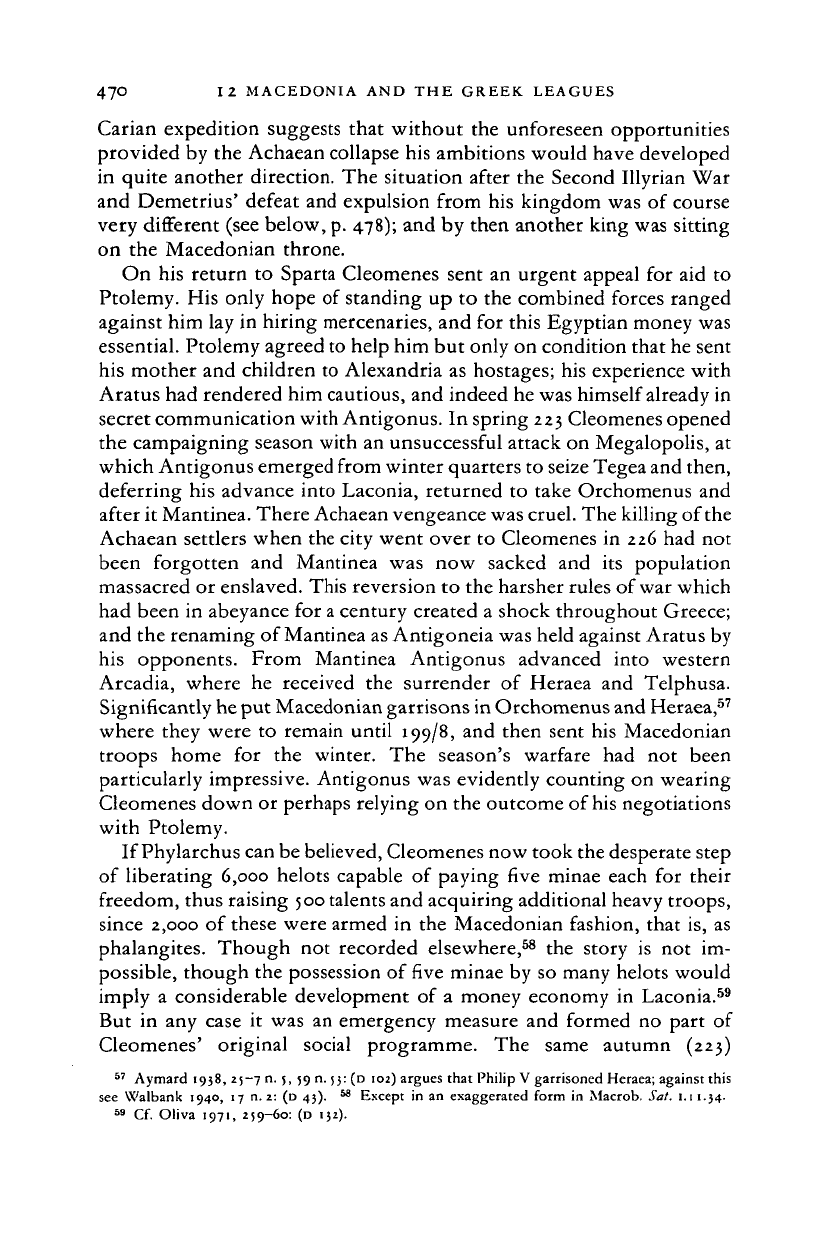
47° 12 MACEDONIA AND THE GREEK LEAGUES
Carian expedition suggests that without
the
unforeseen opportunities
provided by the Achaean collapse his ambitions would have developed
in quite another direction. The situation after the Second Illyrian War
and Demetrius' defeat and expulsion from
his
kingdom was
of
course
very different (see below, p. 478); and by then another king was sitting
on
the
Macedonian throne.
On
his
return
to
Sparta Cleomenes sent
an
urgent appeal
for
aid
to
Ptolemy. His only hope
of
standing up
to
the combined forces ranged
against him lay in hiring mercenaries, and
for
this Egyptian money was
essential. Ptolemy agreed to help him but only on condition that he sent
his mother and children to Alexandria as hostages; his experience with
Aratus had rendered him cautious, and indeed he was himself already in
secret communication with Antigonus. In spring
223
Cleomenes opened
the campaigning season with an unsuccessful attack on Megalopolis,
at
which Antigonus emerged from winter quarters to seize Tegea and then,
deferring his advance into Laconia, returned
to
take Orchomenus and
after it Mantinea. There Achaean vengeance was cruel. The killing of the
Achaean settlers when the city went over
to
Cleomenes
in
226 had
not
been forgotten
and
Mantinea
was now
sacked
and its
population
massacred or enslaved. This reversion to the harsher rules of war which
had been
in
abeyance
for
a
century created
a
shock throughout Greece;
and the renaming of Mantinea as Antigoneia was held against Aratus by
his opponents. From Mantinea Antigonus advanced into western
Arcadia, where
he
received
the
surrender
of
Heraea
and
Telphusa.
Significantly he put Macedonian garrisons in Orchomenus and Heraea,
57
where they were
to
remain until 199/8, and then sent
his
Macedonian
troops home
for the
winter.
The
season's warfare
had not
been
particularly impressive. Antigonus was evidently counting
on
wearing
Cleomenes down
or
perhaps relying on the outcome of
his
negotiations
with Ptolemy.
If Phylarchus can be believed, Cleomenes now took the desperate step
of liberating 6,000 helots capable
of
paying five minae each
for
their
freedom, thus raising
500
talents and acquiring additional heavy troops,
since 2,000
of
these were armed
in the
Macedonian fashion, that is,
as
phalangites. Though
not
recorded elsewhere,
58
the
story
is not im-
possible, though the possession
of
five minae by so many helots would
imply
a
considerable development
of a
money economy
in
Laconia.
59
But
in any
case
it
was
an
emergency measure
and
formed
no
part
of
Cleomenes' original social programme.
The
same autumn
(223)
57
Aymard
193
8,
2 5
-7 n. 5,
5 9
n.
j
3:
(D
I
02)
argues that Philip V garrisoned Heraea; against this
see Walbank 1940,
17
n. 2: (D 43).
M
Except
in an
exaggerated form
in
Macrob. Sat.
1.11.34-
59
Cf.
Oliva 1971, 259-60: (D
132).
Cambridge Histories Online © Cambridge University Press, 2008
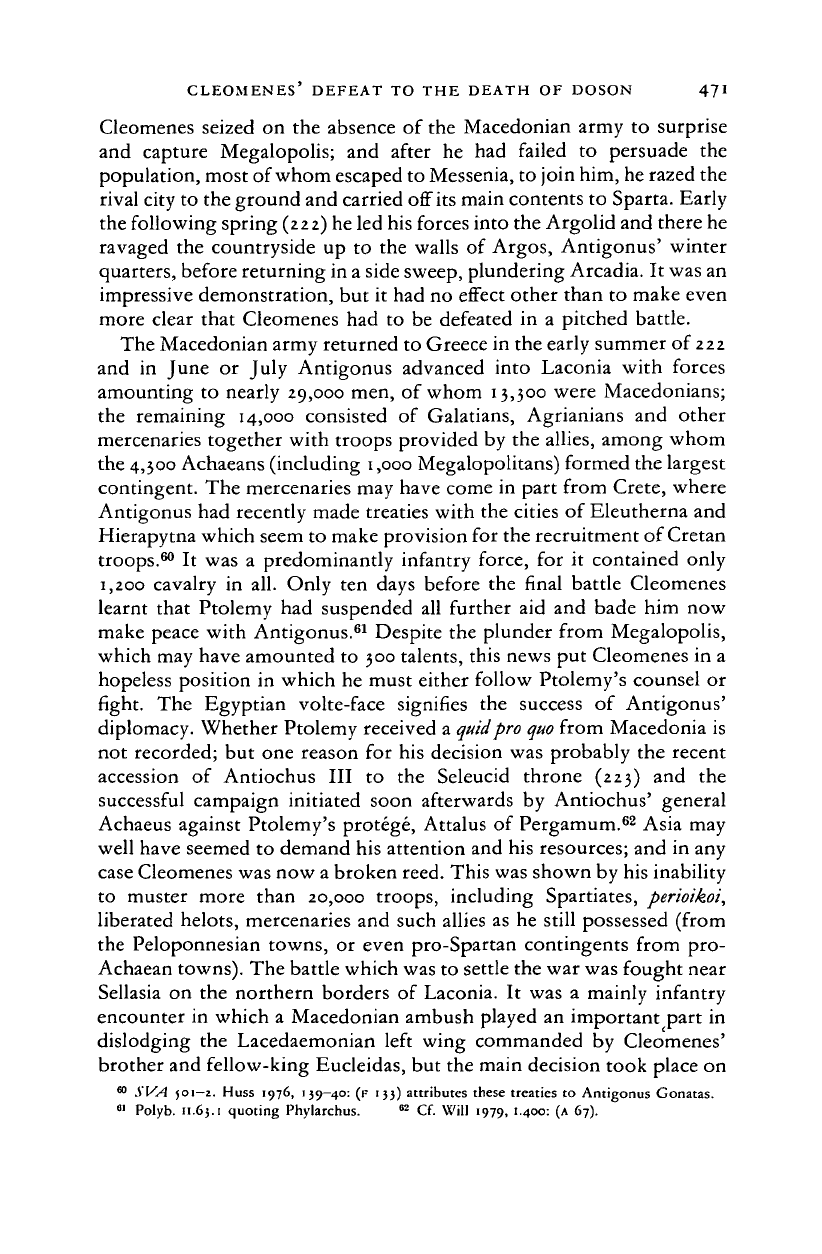
CLEOMENES DEFEAT TO THE DEATH OF DOSON 471
Cleomenes seized
on the
absence
of
the Macedonian army
to
surprise
and capture Megalopolis;
and
after
he
had
failed
to
persuade
the
population, most of whom escaped to Messenia, to join him, he razed the
rival city to the ground and carried off
its
main contents to Sparta. Early
the following spring (222) he led his forces into the Argolid and there he
ravaged
the
countryside
up to the
walls
of
Argos, Antigonus' winter
quarters, before returning in a side sweep, plundering Arcadia.
It
was an
impressive demonstration,
but it
had no effect other than
to
make even
more clear that Cleomenes
had to be
defeated
in
a
pitched battle.
The Macedonian army returned to Greece in the early summer
of
222
and
in
June
or
July Antigonus advanced into Laconia with forces
amounting
to
nearly 29,000 men,
of
whom 13,300 were Macedonians;
the remaining 14,000 consisted
of
Galatians, Agrianians
and
other
mercenaries together with troops provided
by
the allies, among whom
the 4,300 Achaeans (including 1,000 Megalopolitans) formed the largest
contingent. The mercenaries may have come
in
part from Crete, where
Antigonus had recently made treaties with the cities
of
Eleutherna and
Hierapytna which seem to make provision for the recruitment
of
Cretan
troops.
60
It
was
a
predominantly infantry force,
for
it
contained only
1,200 cavalry
in
all.
Only
ten
days before
the
final battle Cleomenes
learnt that Ptolemy
had
suspended
all
further
aid and
bade
him now
make peace with Antigonus.
61
Despite
the
plunder from Megalopolis,
which may have amounted
to
300 talents, this news put Cleomenes
in
a
hopeless position
in
which
he
must either follow Ptolemy's counsel
or
fight.
The
Egyptian volte-face signifies
the
success
of
Antigonus'
diplomacy. Whether Ptolemy received a quid pro
quo
from Macedonia
is
not recorded;
but
one reason
for his
decision was probably
the
recent
accession
of
Antiochus
III to the
Seleucid throne
(223)
and the
successful campaign initiated soon afterwards
by
Antiochus' general
Achaeus against Ptolemy's protege, Attalus
of
Pergamum.
62
Asia may
well have seemed
to
demand his attention and his resources; and in any
case Cleomenes was now a broken reed. This was shown by his inability
to muster more than 20,000 troops, including Spartiates, perioikoi,
liberated helots, mercenaries and such allies
as he
still possessed (from
the Peloponnesian towns,
or
even pro-Spartan contingents from
pro-
Achaean towns). The battle which was to settle the war was fought near
Sellasia
on the
northern borders
of
Laconia.
It
was
a
mainly infantry
encounter
in
which
a
Macedonian ambush played
an
important part
in
dislodging
the
Lacedaemonian left wing commanded
by
Cleomenes'
brother and fellow-king Eucleidas, but the main decision took place
on
60
SVA
joi-2. Huss 1976, 139-40: (F 133) attributes these treaties
to
Antigonus Gonatas.
61
Polyb. 11.63.1 quoting Phylarchus.
•* Cf.
Will 1979,
1.400:
(A
67).
Cambridge Histories Online © Cambridge University Press, 2008
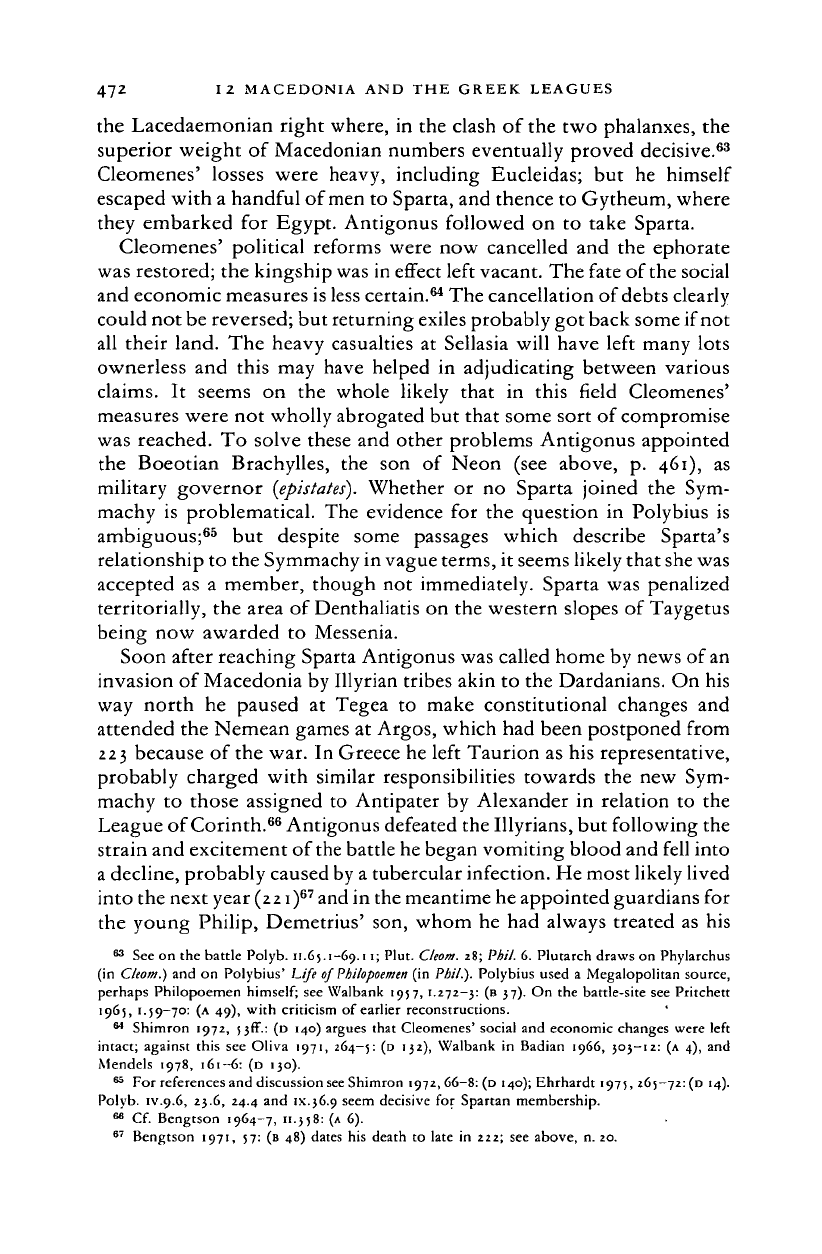
472 12 MACEDONIA AND THE GREEK LEAGUES
the Lacedaemonian right where,
in the
clash
of
the
two
phalanxes,
the
superior weight
of
Macedonian numbers eventually proved decisive.
63
Cleomenes' losses were heavy, including Eucleidas;
but he
himself
escaped with a handful
of
men
to
Sparta, and thence
to
Gytheum, where
they embarked
for
Egypt. Antigonus followed
on to
take Sparta.
Cleomenes' political reforms were
now
cancelled
and the
ephorate
was restored;
the
kingship was in effect left vacant. The fate of the social
and economic measures is less certain.
64
The cancellation of debts clearly
could not be reversed; but returning exiles probably got back some if not
all their land.
The
heavy casualties
at
Sellasia will have left many lots
ownerless
and
this
may
have helped
in
adjudicating between various
claims.
It
seems
on
the
whole likely that
in
this field Cleomenes'
measures were
not
wholly abrogated
but
that some sort
of
compromise
was reached.
To
solve these
and
other problems Antigonus appointed
the Boeotian Brachylles,
the
son
of
Neon
(see
above,
p.
461),
as
military governor
(epistates).
Whether
or
no
Sparta joined
the Sym-
machy
is
problematical.
The
evidence
for the
question
in
Polybius
is
ambiguous;
65
but
despite some passages which describe Sparta's
relationship to the Symmachy in vague terms,
it
seems likely that she was
accepted
as
a
member, though
not
immediately. Sparta
was
penalized
territorially,
the
area
of
Denthaliatis
on the
western slopes
of
Taygetus
being
now
awarded
to
Messenia.
Soon after reaching Sparta Antigonus was called home by news
of
an
invasion
of
Macedonia by Illyrian tribes akin
to the
Dardanians.
On his
way north
he
paused
at
Tegea
to
make constitutional changes
and
attended
the
Nemean games
at
Argos, which
had
been postponed from
223 because
of
the war.
In
Greece
he
left Taurion
as his
representative,
probably charged with similar responsibilities towards
the new Sym-
machy
to
those assigned
to
Antipater
by
Alexander
in
relation
to the
League of Corinth.
66
Antigonus defeated the Illyrians, but following
the
strain and excitement
of
the
battle he began vomiting blood and fell into
a decline, probably caused by a tubercular infection. He most likely lived
into the next year
(221
)
67
and in the meantime he appointed guardians
for
the young Philip, Demetrius'
son,
whom
he had
always treated
as his
63
See on the battle Polyb. 11.65.1-69.11; Plut.
Cleom.
28; Phil.
6.
Plutarch draws on Phylarchus
(in Cleom.) and
on
Polybius' Life 0/
Pbilopoemen
(in Pbil.). Polybius used
a
Megalopolitan source,
perhaps Philopoemen
himself;
see Walbank 1957, 1.272-5: (B 37).
On
the battle-site see Pritchett
1965,
1.59-70:
(A 49), with criticism
of
earlier reconstructions.
M
Shimron 1972,
J3ff.:
(D 140) argues that Cleomenes' social
and
economic changes were left
intact; against this
see
Oliva 1971, 264—5: (D 132), Walbank
in
Badian 1966, 303—12: (A 4),
and
Mendels 1978, 161-6: (D
130).
65
For references and discussion see Shimron 1972, 66-8:
(D
140); Ehrhardt 1975, 265-72:
(D
14).
Polyb. iv.9.6, 23.6, 24.4
and
ix.36.9 seem decisive
for
Spartan membership.
66
Cf.
Bengtson 1964-7, 11.358: (A
6).
67
Bengtson 1971, 57: (B 48) dates
his
death
to
late
in
222; see above,
n.
20.
Cambridge Histories Online © Cambridge University Press, 2008
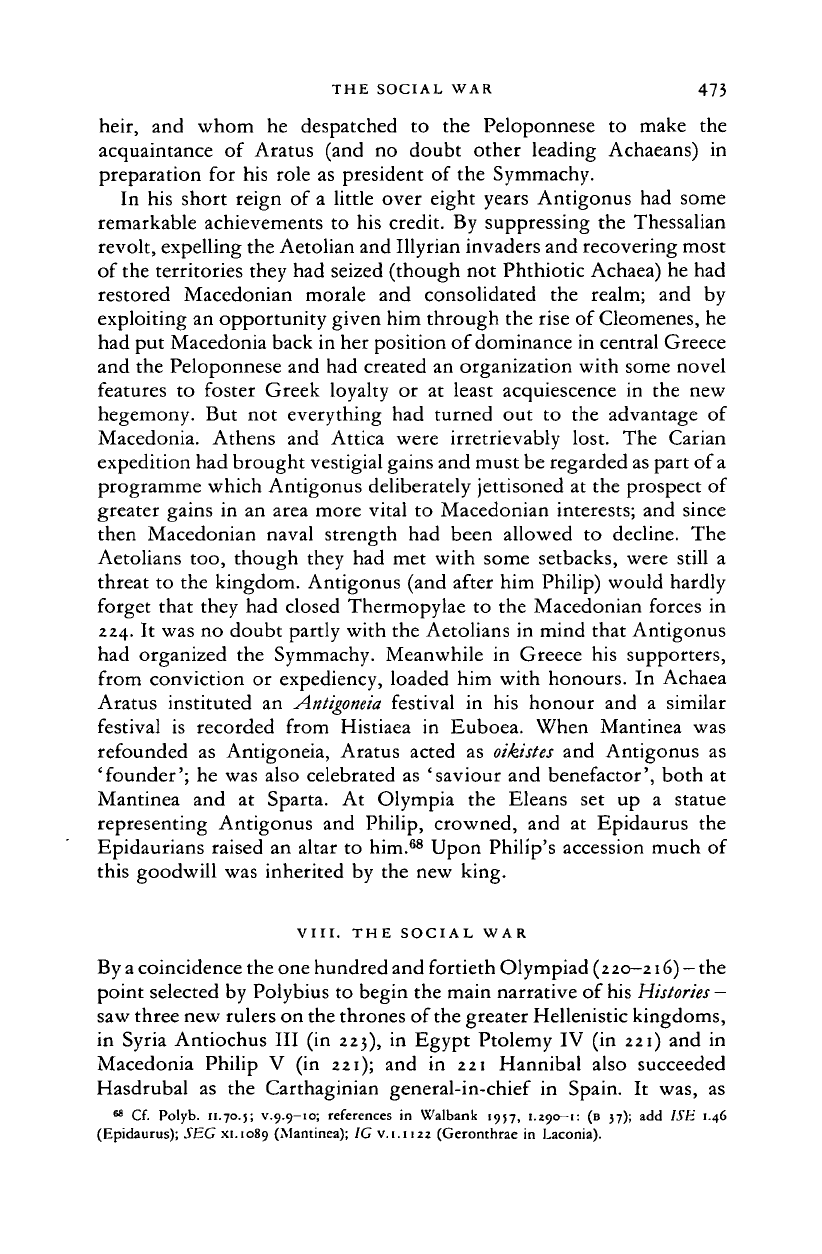
THE SOCIAL WAR 473
heir, and whom he despatched to the Peloponnese to make the
acquaintance of Aratus (and no doubt other leading Achaeans) in
preparation for his role as president of the Symmachy.
In his short reign of a little over eight years Antigonus had some
remarkable achievements to his credit. By suppressing the Thessalian
revolt, expelling the Aetolian and Illyrian invaders and recovering most
of the territories they had seized (though not Phthiotic Achaea) he had
restored Macedonian morale and consolidated the realm; and by
exploiting an opportunity given him through the rise of Cleomenes, he
had put Macedonia back in her position of dominance in central Greece
and the Peloponnese and had created an organization with some novel
features to foster Greek loyalty or at least acquiescence in the new
hegemony. But not everything had turned out to the advantage of
Macedonia. Athens and Attica were irretrievably lost. The Carian
expedition had brought vestigial gains and must be regarded as part of
a
programme which Antigonus deliberately jettisoned at the prospect of
greater gains in an area more vital to Macedonian interests; and since
then Macedonian naval strength had been allowed to decline. The
Aetolians too, though they had met with some setbacks, were still a
threat to the kingdom. Antigonus (and after him Philip) would hardly
forget that they had closed Thermopylae to the Macedonian forces in
224.
It was no doubt partly with the Aetolians in mind that Antigonus
had organized the Symmachy. Meanwhile in Greece his supporters,
from conviction or expediency, loaded him with honours. In Achaea
Aratus instituted an
Antigoneia
festival in his honour and a similar
festival is recorded from Histiaea in Euboea. When Mantinea was
refounded as Antigoneia, Aratus acted as oikistes and Antigonus as
'founder'; he was also celebrated as 'saviour and benefactor', both at
Mantinea and at Sparta. At Olympia the Eleans set up a statue
representing Antigonus and Philip, crowned, and at Epidaurus the
Epidaurians raised an altar to him.
68
Upon Philip's accession much of
this goodwill was inherited by the new king.
VIII. THE SOCIAL WAR
By
a
coincidence the one hundred and fortieth Olympiad (220-216)
—
the
point selected by Polybius to begin the main narrative of his
Histories —
saw three new rulers on the thrones of
the
greater Hellenistic kingdoms,
in Syria Antiochus III (in 223), in Egypt Ptolemy IV (in 221) and in
Macedonia Philip V (in 221); and in 221 Hannibal also succeeded
Hasdrubal as the Carthaginian general-in-chief in Spain. It was, as
68
Cf. Polyb. 11.70.5; v.9.9-10; references in Walbank 1957, 1.Z90-1: (B 37); add ISH 1.46
(Epidaurus); SEC xi.1089 (Mantinea); IC v.1.1122 (Geronthrae in Laconia).
Cambridge Histories Online © Cambridge University Press, 2008
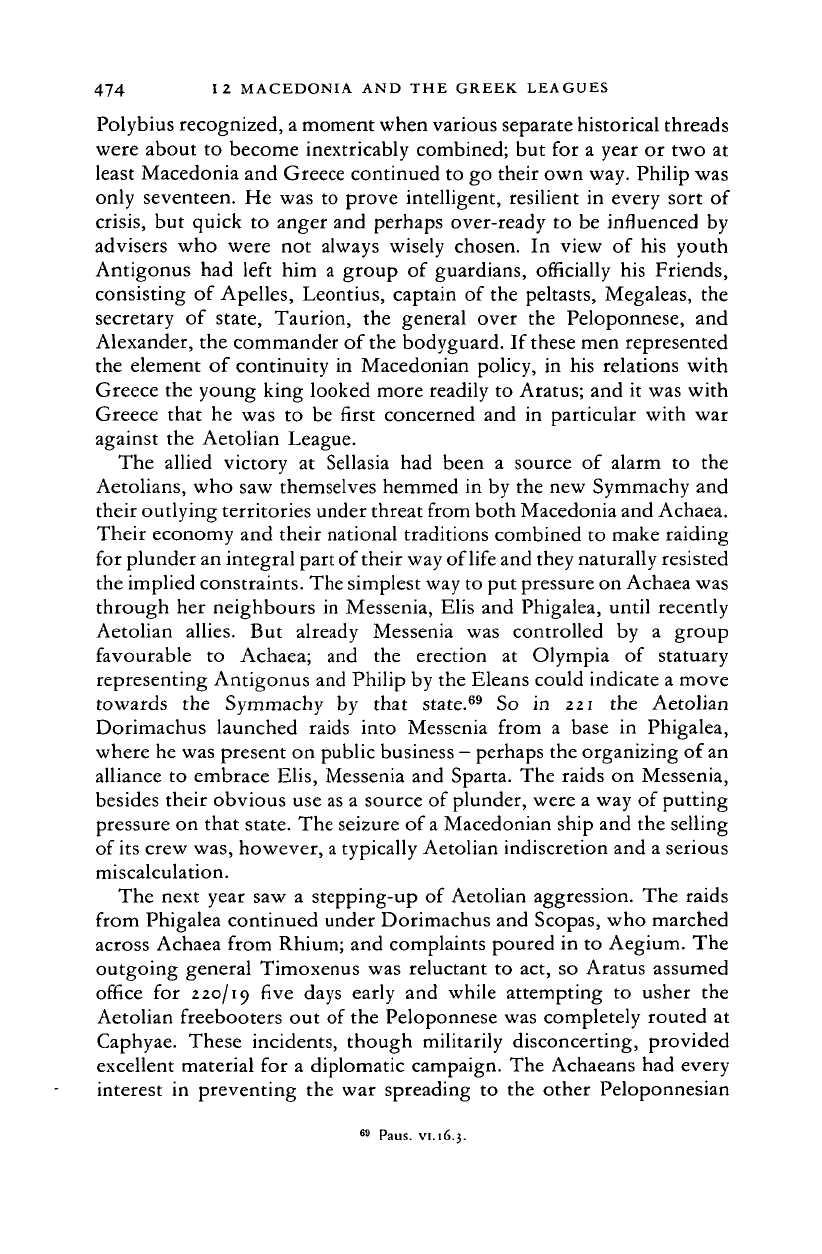
474
I2
MACEDONIA AND THE GREEK LEAGUES
Polybius recognized, a moment when various separate historical threads
were about to become inextricably combined; but for a year or two at
least Macedonia and Greece continued to go their own way. Philip was
only seventeen. He was to prove intelligent, resilient in every sort of
crisis,
but quick to anger and perhaps over-ready to be influenced by
advisers who were not always wisely chosen. In view of his youth
Antigonus had left him a group of guardians, officially his Friends,
consisting of Apelles, Leontius, captain of the peltasts, Megaleas, the
secretary of state, Taurion, the general over the Peloponnese, and
Alexander, the commander of the bodyguard. If these men represented
the element of continuity in Macedonian policy, in his relations with
Greece the young king looked more readily to Aratus; and it was with
Greece that he was to be first concerned and in particular with war
against the Aetolian League.
The allied victory at Sellasia had been a source of alarm to the
Aetolians, who saw themselves hemmed in by the new Symmachy and
their outlying territories under threat from both Macedonia and Achaea.
Their economy and their national traditions combined to make raiding
for plunder an integral part of their way of life and they naturally resisted
the implied constraints. The simplest way to put pressure on Achaea was
through her neighbours in Messenia, Elis and Phigalea, until recently
Aetolian allies. But already Messenia was controlled by a group
favourable to Achaea; and the erection at Olympia of statuary
representing Antigonus and Philip by the Eleans could indicate a move
towards the Symmachy by that state.
69
So in 221 the Aetolian
Dorimachus launched raids into Messenia from a base in Phigalea,
where he was present on public business
—
perhaps the organizing of an
alliance to embrace Elis, Messenia and Sparta. The raids on Messenia,
besides their obvious use as a source of plunder, were a way of putting
pressure on that state. The seizure of
a
Macedonian ship and the selling
of its crew was, however, a typically Aetolian indiscretion and a serious
miscalculation.
The next year saw a stepping-up of Aetolian aggression. The raids
from Phigalea continued under Dorimachus and Scopas, who marched
across Achaea from Rhium; and complaints poured in to Aegium. The
outgoing general Timoxenus was reluctant to act, so Aratus assumed
office for 220/19 five days early and while attempting to usher the
Aetolian freebooters out of the Peloponnese was completely routed at
Caphyae. These incidents, though militarily disconcerting, provided
excellent material for a diplomatic campaign. The Achaeans had every
interest in preventing the war spreading to the other Peloponnesian
69
Paus.
vi.16.3.
Cambridge Histories Online © Cambridge University Press, 2008
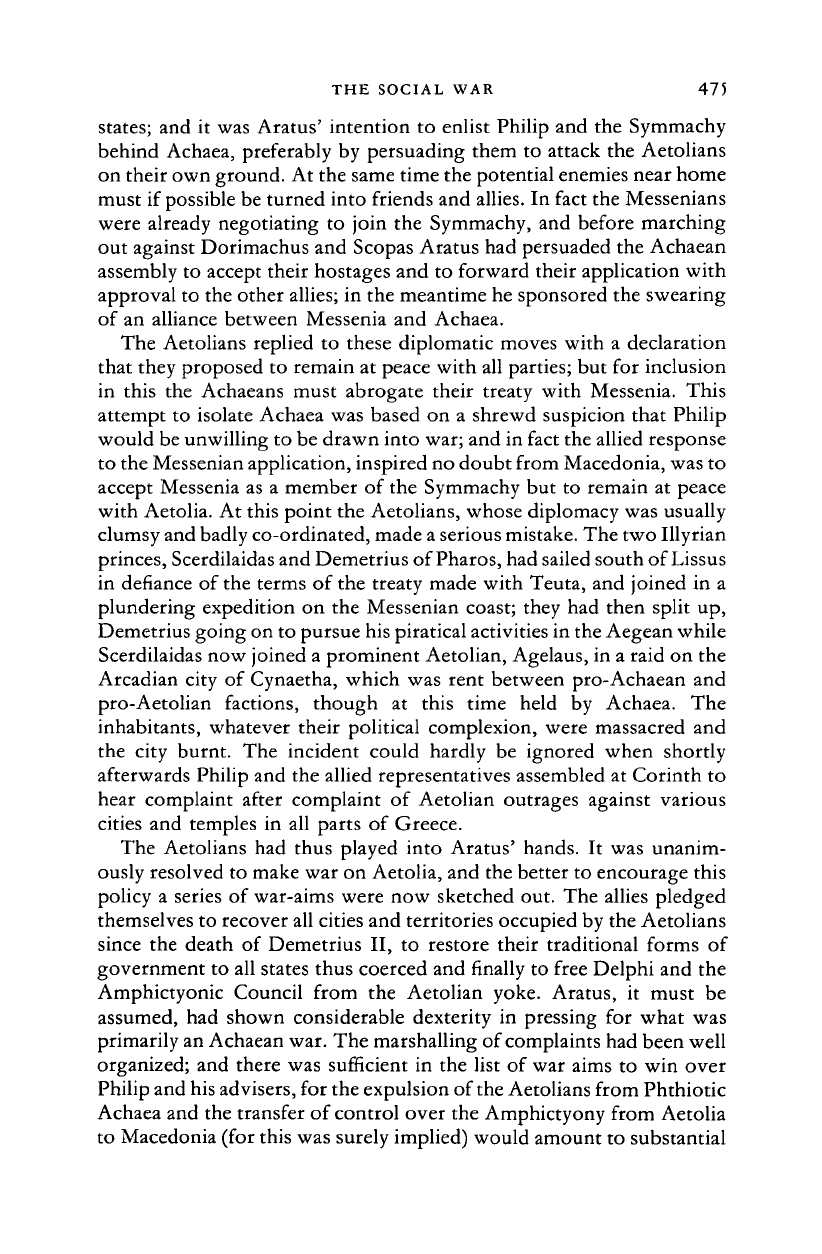
THE SOCIAL WAR 475
states;
and it was Aratus' intention to enlist Philip and the Symmachy
behind Achaea, preferably by persuading them to attack the Aetolians
on their own ground. At the same time the potential enemies near home
must if possible be turned into friends and allies. In fact the Messenians
were already negotiating to join the Symmachy, and before marching
out against Dorimachus and Scopas Aratus had persuaded the Achaean
assembly to accept their hostages and to forward their application with
approval to the other allies; in the meantime he sponsored the swearing
of an alliance between Messenia and Achaea.
The Aetolians replied to these diplomatic moves with a declaration
that they proposed to remain at peace with all parties; but for inclusion
in this the Achaeans must abrogate their treaty with Messenia. This
attempt to isolate Achaea was based on a shrewd suspicion that Philip
would be unwilling to be drawn into war; and in fact the allied response
to the Messenian application, inspired no doubt from Macedonia, was to
accept Messenia as a member of the Symmachy but to remain at peace
with Aetolia. At this point the Aetolians, whose diplomacy was usually
clumsy and badly co-ordinated, made a serious mistake. The two Illyrian
princes, Scerdilaidas and Demetrius of Pharos, had sailed south of Lissus
in defiance of the terms of the treaty made with Teuta, and joined in a
plundering expedition on the Messenian coast; they had then split up,
Demetrius going on to pursue his piratical activities in the Aegean while
Scerdilaidas now joined a prominent Aetolian, Agelaus, in a raid on the
Arcadian city of Cynaetha, which was rent between pro-Achaean and
pro-Aetolian factions, though at this time held by Achaea. The
inhabitants, whatever their political complexion, were massacred and
the city burnt. The incident could hardly be ignored when shortly
afterwards Philip and the allied representatives assembled at Corinth to
hear complaint after complaint of Aetolian outrages against various
cities and temples in all parts of Greece.
The Aetolians had thus played into Aratus' hands. It was unanim-
ously resolved to make war on Aetolia, and the better to encourage this
policy a series of war-aims were now sketched out. The allies pledged
themselves to recover all cities and territories occupied by the Aetolians
since the death of Demetrius II, to restore their traditional forms of
government to all states thus coerced and finally to free Delphi and the
Amphictyonic Council from the Aetolian yoke. Aratus, it must be
assumed, had shown considerable dexterity in pressing for what was
primarily an Achaean war. The marshalling of complaints had been well
organized; and there was sufficient in the list of war aims to win over
Philip and his advisers, for the expulsion of the Aetolians from Phthiotic
Achaea and the transfer of control over the Amphictyony from Aetolia
to Macedonia (for this was surely implied) would amount to substantial
Cambridge Histories Online © Cambridge University Press, 2008
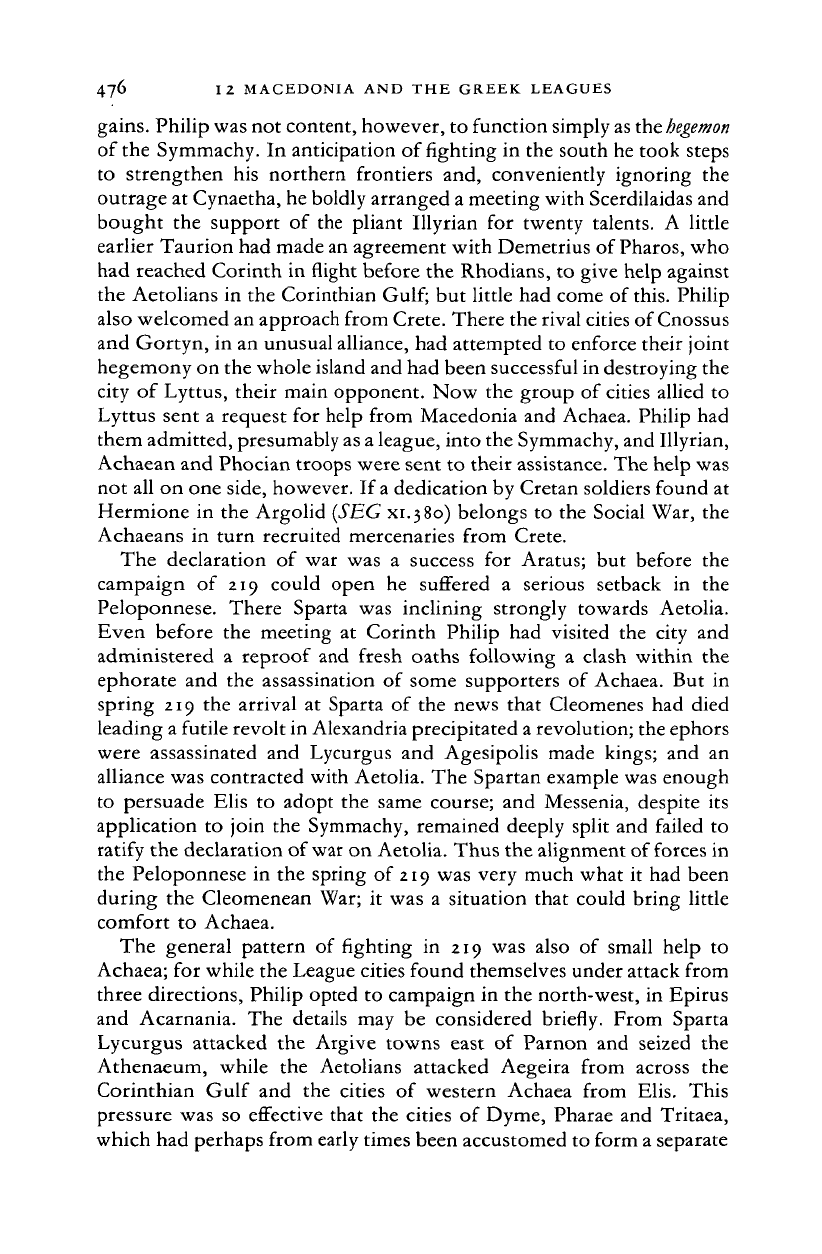
476 12 MACEDONIA AND THE GREEK LEAGUES
gains.
Philip was not content, however, to function simply as the
hegemon
of the Symmachy. In anticipation of fighting in the south he took steps
to strengthen his northern frontiers and, conveniently ignoring
the
outrage at Cynaetha, he boldly arranged a meeting with Scerdilaidas and
bought the support
of
the pliant Illyrian
for
twenty talents.
A
little
earlier Taurion had made an agreement with Demetrius of
Pharos,
who
had reached Corinth in flight before the Rhodians, to give help against
the Aetolians in the Corinthian
Gulf;
but little had come of
this.
Philip
also welcomed an approach from Crete. There the rival cities of Cnossus
and Gortyn, in an unusual alliance, had attempted to enforce their joint
hegemony on the whole island and had been successful in destroying the
city of Lyttus, their main opponent. Now the group of cities allied to
Lyttus sent a request for help from Macedonia and Achaea. Philip had
them admitted, presumably as a league, into the Symmachy, and Illyrian,
Achaean and Phocian troops were sent to their assistance. The help was
not all on one side, however. If
a
dedication by Cretan soldiers found at
Hermione in the Argolid (SEG xi.380) belongs to the Social War, the
Achaeans
in
turn recruited mercenaries from Crete.
The declaration
of
war was
a
success
for
Aratus; but before
the
campaign
of
219 could open
he
suffered
a
serious setback
in the
Peloponnese. There Sparta was inclining strongly towards Aetolia.
Even before the meeting
at
Corinth Philip had visited the city and
administered
a
reproof and fresh oaths following
a
clash within the
ephorate and the assassination
of
some supporters of Achaea. But in
spring 219 the arrival
at
Sparta
of
the news that Cleomenes had died
leading a futile revolt in Alexandria precipitated a revolution; the ephors
were assassinated and Lycurgus and Agesipolis made kings; and
an
alliance was contracted with Aetolia. The Spartan example was enough
to persuade Elis
to
adopt the same course; and Messenia, despite its
application to join the Symmachy, remained deeply split and failed to
ratify the declaration of
war
on Aetolia. Thus the alignment of forces in
the Peloponnese in the spring of 219 was very much what
it
had been
during the Cleomenean War;
it
was
a
situation that could bring little
comfort to Achaea.
The general pattern
of
fighting
in
219 was also
of
small help
to
Achaea; for while the League cities found themselves under attack from
three directions, Philip opted to campaign in the north-west, in Epirus
and Acarnania. The details may
be
considered briefly. From Sparta
Lycurgus attacked the Argive towns east
of
Parnon and seized the
Athenaeum, while
the
Aetolians attacked Aegeira from across
the
Corinthian Gulf and the cities
of
western Achaea from Elis. This
pressure was so effective that the cities of Dyme, Pharae and Tritaea,
which had perhaps from early times been accustomed to form a separate
Cambridge Histories Online © Cambridge University Press, 2008
